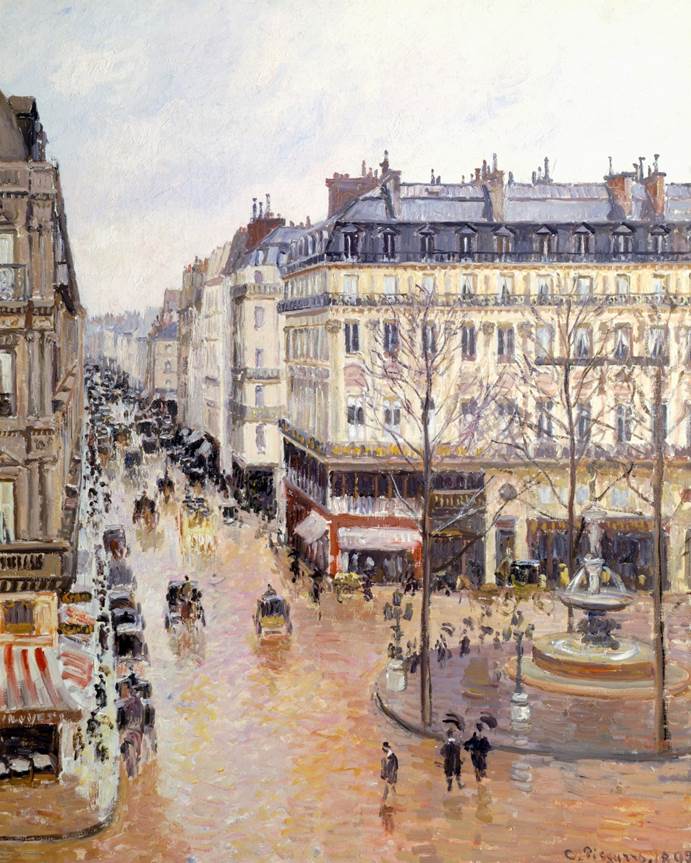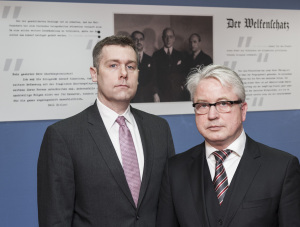(WASHINGTON-October 22, 2020) The heirs to the Jewish art dealers who were forced to sell the medieval devotional art collection known as the Welfenschatz (in English, the Guelph Treasure) to agents of Hermann Goering in 1935 filed their brief today in the Supreme Court of the United States. It can be viewed at this link. The Supreme Court is set to hear argument on December 7, 2020, on whether the Foreign Sovereign Immunities Act (FSIA) and its “takings clause” create jurisdiction over the heirs’ claims for restitution of the Welfenschatz—as all reviewing courts so far have held. The Welfenschatz is held by the Stiftung Preussischer Kulturbesitz (in English, the Prussian Cultural Heritage Foundation).
At U.S. Supreme Court, Jewish Heirs Lay Claim to Treasure Taken by Nazi Agents in 1935
Topics: Third Reich, Gestapo, Z.M. Hackenbroch, Prussia, Germany, Nazi-looted art, Foreign Sovereign Immunities Act, Markus Stoetzel, Supreme Court, Mel Urbach, SPK, Nuremberg race laws, Stiftung Preussischer Kulturbesitz, Hermann Goering, FSIA, NS Raubkunst, Sullivan & Worcester LLP, J.S. Goldschmidt, Gerald Stiebel, Prussian Cultural Heritage Foundation, Adolf Hitler, Nicholas M. O'Donnell, Alan Philipp, Welfenschatz, I. Rosenbaum, Paul Körner, Wannsee Conference, Jed Leiber, House of Brunswick (Braunschweig)-Lüneberg, Emily Haber, Wilhelm Stuckart, Final Solution
The U.S. Court of Appeals for the D.C. Circuit today dismissed the petition to rehear en banc last year’s landmark ruling that the heirs of the art dealers who sold the Guelph Treasure (or Welfenschatz) may pursue their claims in U.S. federal court. Defendants the Federal Republic of Germany and the Stiftung Preussischer Kulturbesitz (the SPK, or Prussian Cultural Heritage Foundation in English) had argued that claims under the Foreign Sovereign Immunities Act’s expropriation exception such as these are not violations of international law and also require a claimant to exhaust remedies abroad, a position rejected by prior decisions of the D.C. Circuit and by today’s ruling as well.
Today’s decision confirms the first-of-its kind holding last year that a German state museum must face claims based on allegations of Nazi-looted art, a direct result of Germany’s failures through its so-called Advisory (often called Limbach) Commission to address seriously and comprehensively the state of Nazi-looted art in its national collections. In the five years since denying the Guelph Treasure claimants any meaningful attention, Germany has fumbled through the Gurlitt fiasco and attempted other various distractions like its new fitful attention to colonial art (with no real progress there either). Germany has repeatedly disparaged my clients by suggesting that the matter was already "decided on the merits" before Germany's Advisory Commission. This is false. The Advisory Commission renders non-binding recommendations to state museums and has been roundly criticized for its opinions in 2014 and 2015 in particular, when my clients were denied justice. There is no small irony in having to explain this in the context of Germany's request for a do-over after last year's ruling.
Topics: Third Reich, Feist, Prussia, Germany, Nazi-looted art, Foreign Sovereign Immunities Act, SPK, Advisory Commission, Stiftung Preussischer Kulturbesitz, Hermann Goering, expropriation exception”, Nazi persecution, Boy Leading a Horse, NS Raubkunst, J.S. Goldschmidt, Prussian Cultural Heritage Foundation, forced sale, Zacharias Hackenbroch, Welfenschatz, I. Rosenbaum, Holocaust Expropriated Art Recovery Act, HEAR Act, Paul Körner, Staatliche Museen zu Berlin, Kunstgewerbemuseum
Thyssen-Bornemisza Prevails Over Cassirer Heirs' Claim to Pissarro Taken by Nazis Despite Acts “Inconsistent with the Washington Principles”
One of the longest-running court cases in the United States about art looted by the Nazis has been decided in favor of the current possessor, the Thyssen-Bornemisza Museum in Madrid, an instrumentality of the Kingdom of Spain. The U.S. District Court in Los Angeles ruled on April 30, 2019 against the heirs of Lilly Cassirer, a German Jew whom the Nazis targeted in 1939 for a forced sale of Rue Saint–Honoré, après-midi, effect de pluie (1892). The ruling is the second time that the museum has prevailed in the District Court as the owner of the painting under Spanish law, now on the grounds the museum did not know of the painting’s looting history when it acquired the work and that it held the work publicly for long enough to become its owner even though it had been stolen. The ruling, while favorable to the museum in this case, confirms important principles about the inability of successive possessors to acquire good title to artworks stolen by the Nazis, and the importance of diligence and pursuing questions raised by red flags in the chain of title. Notable as well was the Court’s pointed criticism of Spain for failing to adhere to the spirit of the Washington Principles on Nazi-Confiscated Art, and Spain’s failure to “comply with its moral commitments.”
Topics: Walter Feilchenfeldt, Third Reich, Terezin Declaration, Gestapo, Lilly Cassirer, Claude Cassirer, Jacques Goudstikker, Nazi-looted art, Czechoslovakia, Spain, Washington Principles, Baron Hans-Heinrich Thyssen- Bornemisza, A Tragic Fate, Law and Ethics in the Battle Over Nazi-Looted Art, Reichskammer der bildenden Künste, flight taxes, Rue Saint–Honoré, Julius Cassirer, Paul Durand-Ruel, Ludwigstrasse, Dr. Cassirer and Co. Kabelwerke, Jakob Scheidwimmer, Sydney Schoenberg, Hahn Gallery, Thyssen-Bornemisza Museum, Military Government Law No. 59, Reich Chamber of the Visual Arts, Ari Walter Kampf, Eugen Kampf, Knoedler & Co. Gallery, encubridor
No Extradition to Poland for Dealer Accused of Trying to Sell Nazi-Looted Art
A Polish man arrested in February after being accused of trying to sell in Moscow a painting looted by the German army from the National Museum of Poznan during World War II will not be extradited to Poland. The U.S. District Court in New York (Rakoff, J.) concluded that Alexander Khochinsky did not acquire "Girl with Dove" by Antoine Pesne—stolen by the German army—with the knowledge that it was stolen property, and thus, could not be extradited. While there could be a second attempt to extradite him for his conduct after he learned the Polish government considered the painting to be stolen (when he had proposed to exchange it for restitution for his mother’s home), it seems unlikely. The whereabouts of the painting are unknown.
Topics: Republic of Poland, Alexander Khochinsky, Third Reich, Polish Ministry of Culture and National Heritage, extradition, Book of Acquisitions of the Greater Poland Museum, Moscow, Restitution, "Girl with Dove", World War II, Antoine Pesne, Kaiser Friedrich-Museum, National Museum of Poznan, Litigation, Diplomatic Note No. 35-15-2013, Rakoff
Guelph Treasure Claims—Coverage and Analysis
It has been almost two weeks since I filed my clients’ claims for restitution of the Guelph Treasure (Welfenschatz).
Topics: Maria Altmann, Frankfurter Allgemeine Zeitung, National Socialists, Third Reich, artdaily.org, Reuters, United States Supreme Court, Gestapo, Haaretz, Deutschlandradio. Deutsche Presse Agentur, Robin Young, the Guardian, The Art Newspaper, Foreign Sovereign Immunities Act, The Wall Street Journal, Deutsche Welle, Santa Fe, KRQE News 13, the Observer, Markus Stoetzel, Die Erle, Mel Urbach, Nazis, Advisory Commission, 3SAT, ZDF, Stiftung Preussischer Kulturbesitz, Washington DC, Hermann Goering, Private Wealth, Restitution, Sullivan & Worcester LLP, Here & Now, Gerald Stiebel, World War II, Foreign Sovereign Immunities, flight tax, Süddeutsche Zeitung, Adolf Hitler, United States District Court, The New York Times, Federal Republic of Germany, BBC News Europe, Alan Phillip, Welfenschatz, NPR, PrivateArtInvestor, ArtNet news
Civil Action Filed Against Germany for Restitution of Guelph Treasure
I filed yesterday a new civil action against the Federal Republic of Germany and the Stiftung Preussischer Kulturbesitz (the SPK, which is responsible the administration of the Berlin museums, among other things) in the United States District Court in Washington, DC. You can read the Complaint here. The lawsuit seeks the immediate restitution to my clients of the collection held by the SPK known as the Welfenschatz, or as it is referred to in English, the Guelph Treasure. My clients Gerald Stiebel and Alan Phillip are the blood relatives and successors to the consortium of Jewish art dealers who were threatened and forced by the National Socialist government into selling the Welfenschatz in 1935.
Topics: Maria Altmann, National Socialists, Third Reich, Philipp v. Federal Republic of Germany et al. 15-c, United States Supreme Court, Gestapo, Foreign Sovereign Immunities Act, Markus Stoetzel, Mel Urbach, Nazis, Advisory Commission, Stiftung Preussischer Kulturbesitz, Washington DC, Hermann Goering, Restitution, Sullivan & Worcester LLP, Gerald Stiebel, World War II, flight tax, Adolf Hitler, United States District Court, Federal Republic of Germany, Alan Phillip, Welfenschatz
Sullivan & Worcester LLP Press Release Concerning Claims For Guelph Treasure
Topics: Maria Altmann, National Socialists, Third Reich, Philipp v. Federal Republic of Germany et al. 15-c, United States Supreme Court, Gestapo, Foreign Sovereign Immunities Act, Markus Stoetzel, Mel Urbach, Nazis, Advisory Commission, Stiftung Preussischer Kulturbesitz, Washington DC, Hermann Goering, Restitution, Sullivan & Worcester LLP, Gerald Stiebel, World War II, Foreign Sovereign Immunities, flight tax, Adolf Hitler, United States District Court, Federal Republic of Germany, Alan Phillip, Welfenschatz






